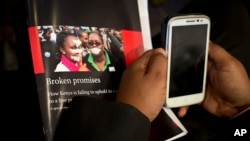Newly announced rules that regulate the way Kenyan journalists cover elections are impractical and a possible overreach of government authority, according to the head of the Media Council of Kenya.
Council chief Charles Kerich spoke to VOA's Swahili service Wednesday, a day after Kenya's Communications Authority issued rules that, among other things, require Kenyan journalists to keep all notes and recordings for six months and make sure that radio and TV guests do not make hateful statements about individuals and ethnic groups.
Kerich questioned whether the Communications Authority has the power to issue such rules, and said the media council and Kenyan news outlets were not consulted before the guidelines were issued.
He also questioned why media outlets should be held accountable if a guest utters a hateful remark.
"I think the primary responsibility should be on the person who is making the defamatory or inciting remarks, not on the media house," he said. "They can't be held liable because somebody spoke a word that was deemed unacceptable."
Kerich said he is fine with the rule to save notes and recordings, unless the government uses it to seize material for use in law enforcement and prosecutions.
"The moment journalists are seen to be gathering news for security organs, you no longer become welcome at some events," he said. "And you know, cultivating sources takes a pretty long time, but if the source thinks that ... whatever you collect is going to be used against them, with you as the witness, that will not work."
The Media Council of Kenya is a quasi-governmental body designed to protect media independence in the country while enforcing standards of professionalism. It draws its authority from Kenya's 2013 Media Act.
The deputy chief of the media council, Victor Bwire, defended the Communications Authority, saying the rules it announced were already in place and just need to be enforced.
"So we have called all broadcasters, especially TV and radio, so we can discuss together as we look forward to the election in August. Already, campaigns have started. Some media houses are not doing their job properly," he told VOA.
"So the main reason of talking to them today, is to remind them the laws that guide broadcasting operations in the country."





